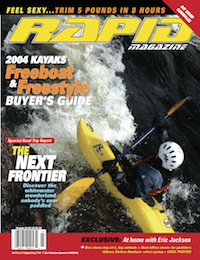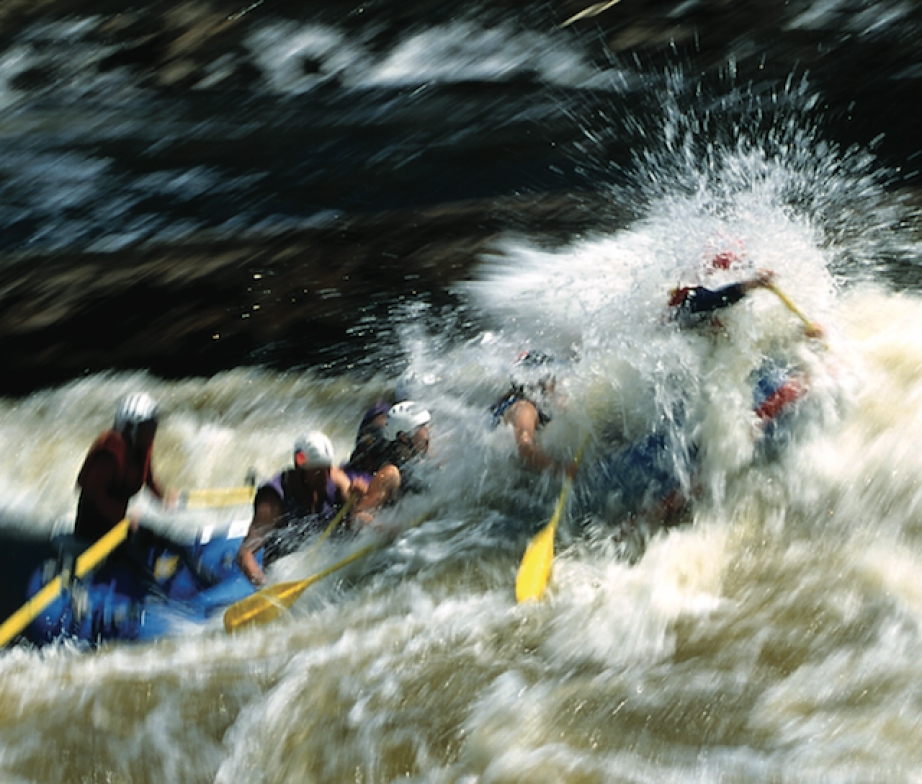Climbing over each cross-tube one at a time, working her way to the back of the raft, Angelina picks up the guide stick. It looks heavy in her tiny hands. She jams a size-four running shoe under a cross-tube and quietly briefs her team a last time before pushing off above Triplet Rapid. Her darting glances at me for assurance betray her brash New York City manner. With the grip of the current at the lip of the rapid, I watch her search for her line between two pourovers. She looks to me, brown eyes streaming with tears, and asks, “Does life always hurt?”
Angelina is far from home and her struggle with depression. Shattered at a young age by the tragic death of her parents and a string of foster homes that did more harm than good, Angelina fell deeper and deeper into despair. Eventual hospitalization drove her to turn her life around. Her counsellor recommended this Outward Bound course, learning to guide a raft on a seven-day whitewater trip in Utah’s Lodore Canyon.
This is a well-travelled path, using the wilderness for growth, change and therapy. Longstanding programs such as Outward Bound, Project Dare and Boundless Adventures have moved tens of thousands of people through some stage in their life via the medium of a simple wilderness trip. With a claim to inspire self-esteem, self-reliance and concern for others, “challenge” is a central theme. While some programs seek the mountains or use a ropes course, the vast majority take to the challenge and healing power of rivers.
For 20 years, pipe-smoking psychologists in their leather chairs have poked and prodded at this adventure education therapy phenomenon. They recognize that when removed from familiar “environments,” people approach new challenges without preconceived notions of what they can or can’t do, more often than not utterly amazing themselves at what they accomplish, such as guiding a class III rapid. There is no overwhelming clinical evidence, though, that these achievements somehow make their lives different when they return home to the rat race.
What scientists failto conclusively prove (to themselves) flies in the face of what river guides and instructors experience every day: a river trip can irrevocably change a person’s outlook. A few days floating on water offers perspective—the perspective it takes to come up with alternatives in one’s life.
Oblivious to the clinical idea of “therapy,” these guides know they are just the key-holders who unlock the river. Their job is simply to let people experience it on their own terms and challenge what they need to inside themselves.
There is no one reason why rivers peel away our outer layers exposing our core. Every person will have their own experience, but I believe there is something underlying that is more fundamental than just being outside, away from life’s pressures. Rivers are the most visible means of seeing our world as a living, breathing, continuous system. Being on, in, and around flowing rivers connects us to that process, connects us to the Earth, and re-connects us to our lost soul—a soul that gets beaten down from the daily grind.
From this continuous cycle of regeneration and mindless flow of rivers one may take any number of things: assurance that life will continue despite hardship, trust and surrender to a greater power, or new confidence from managing in an inherently unmanageable environment.
Pipe-smoking psychologists poke and prod at adventure therapy.
These are the same reasons that paddlers and fishermen flock to rivers. We tell our friends we are there to challenge ourselves, surf, or catch a trout. But, the deeper reason why is our connection to flow—a connection that is so elemental we struggle to put a finger on it.
The last evening of Angelina’s Outward Bound trip is a celebration of what we have accomplished as a group and what each individual has proven to themselves. We sit at the river’s edge, in the darkness and silence, soaking up what we will be leaving in the morning.
All trip, Angelina was whittling away at a driftwood stick, something I thought she’d take home with her, keep in a sock drawer or make into a necklace. Instead, she ceremoniously places it in the river. She lets it go. Satisfied, and in the tone of one with a secret well-kept, tells us, “It doesn’t matter if the pain goes away. The river keeps flowing.” She crawls into her sleeping bag happy, secure in knowing that when she returns home, her experience will continue floating in the current, carried by the power of the water.





